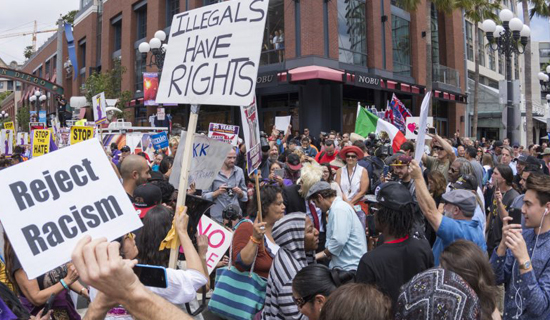
PRESIDENT TRUMP’S EXECUTIVE ORDER CAUSES MAYHEM: WHAT DOES THE BAN MEAN TO YOU?
On January 27 2017, just seven days in office, President Trump has already caused mayhem internationally after issuing a highly controversial and unpopular Executive Order titled “Protecting the Nation from Foreign Terrorist Entry into the United States.”
Who is Affected by the Ban?
The order bars nationals from Iraq, Syria, Iran, Libya, Somalia, Sudan, and Yemen from entering the United States for 90 days.
Legal Permanent Residents (Green Card Holders): When first signed, the order included green card holders. As we have seen, Legal Permanent Residents of the U.S. traveling on a valid green card or I-551 will be allowed to board U.S. bound flights and apply for a national interest waiver. DHS will admit LPRs on a case-by-case basis after additional and thorough screening. Unless there is a significant history of criminal behavior or links to terrorist activity, there should be no issue.
Further, it has been reported that customs agents are coercing LPRs to sign the I-407, Record of Abandonment of Lawful Permanent Resident Status. MSA advises not to sign any document as it will take away your status as an LPR (or green card holder).
Immigrant / Nonimmigrant Visa Holders: Nationals of the seven banned countries holding valid immigrant or non-immigrant visas will not be permitted to enter the United States during the 90-day period. The Executive Order does not affect individuals who were in the U.S. at the time it was signed.
Dual Citizenship / Place of Birth: Dual citizens are being treated according to the travel document presented. We have seen citizens of Canada and the UK being exempted from the order, but will be further screened. Individuals that were born in one of the seven countries should be prepared for a secondary screening.
Mere Travel to the Designated Countries: The Executive Order does not apply to those who merely traveled to the seven designated counties.
What About Refugees?
The Executive Order suspends the U.S. Refugee Admission Program (USRAP) for 120 days and puts the processing of refugees on hold for three months. The vetting of Syrian refugees has been suspended indefinitely. The president also stated that for the year 2017, the number of refugees that can be accepted will be capped at 50, 000, cutting down the number by more than one half.
What is Being Done?
High profile companies, leading lawyers, politicians, actors, foreign leaders, even United States Conference of Catholic Bishops have spoken out against this Order. At least 20 G.O.P. lawmakers, dozens of Democrats, and attorneys general from 15 states have criticized the travel ban, and 1,000 State Department employees signed a letter condemning the measure and its implementation has been delivered to top officials, State Department officials familiar with the memo told CNN Tuesday.
A federal judge in Brooklyn, New York issued an emergency stay for individuals who landed Friday evening and Saturday, preventing the deportation of travelers who had already entered the country following the Executive Order.
The Democratic Party have offered legislation (introduced Bills) and protests to repeal the Executive Order on the ban of the seven countries. It is temporary and it is hoped that it will soon be repealed.
About the Authors:
Rebecca S. Singh, Esq.: As an advanced EB-5 practitioner with Mona Shah & Associates, Rebecca works with project developers, analyzing, crafting and preparing project documents for initial regional center designations. In addition, Rebecca handles direct EB-5 project petitions, and is well versed in USCIS compliance.Rebecca is highly proficient at investor petitions, counseling clients through all stages of the EB-5 Immigrant Investment Program. She has successfully filed complex source of funds issues from clients worldwide.Further, Rebecca is well-versed in consular affairs and adjustment of status cases, handling issues such as consular waivers, problematic “Age Out” issues, international adoption law, and non-immigrant and immigrant visa applications. Rebecca is admitted to practice law in the State of New York and before the United States District Court for the Southern District of New York.



